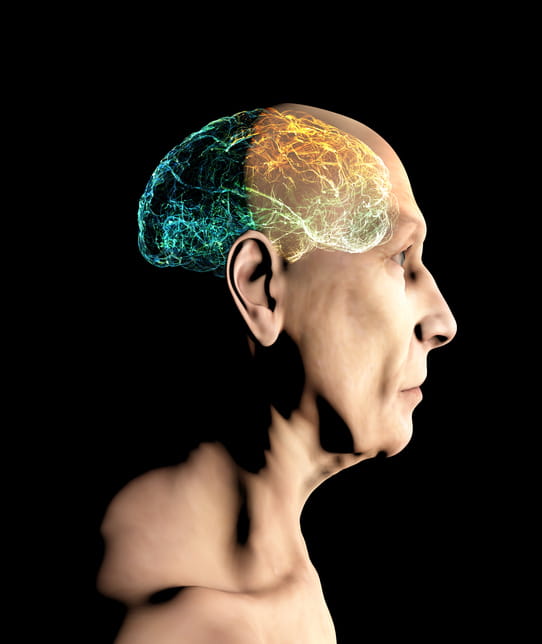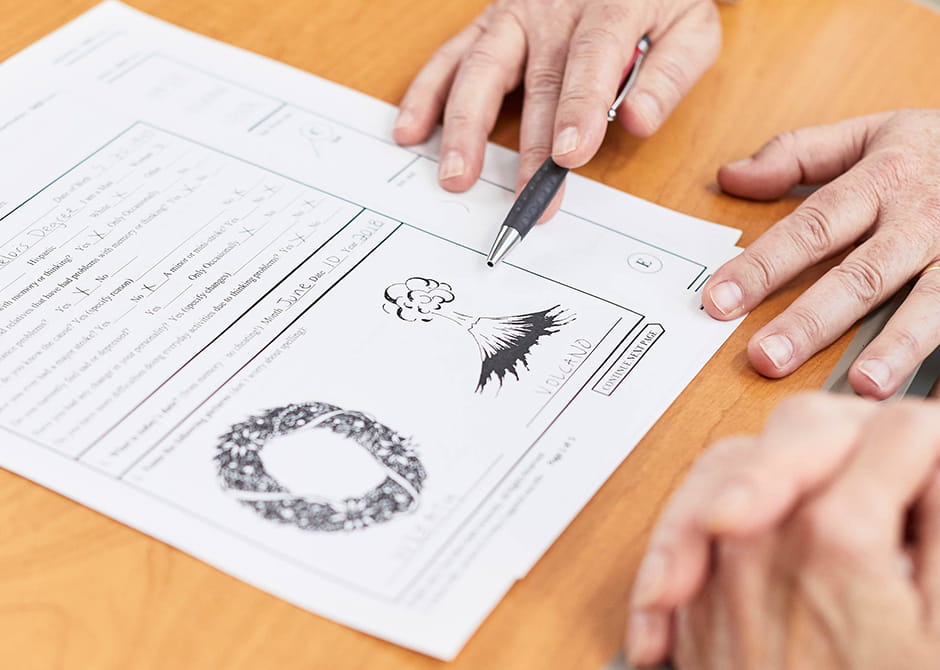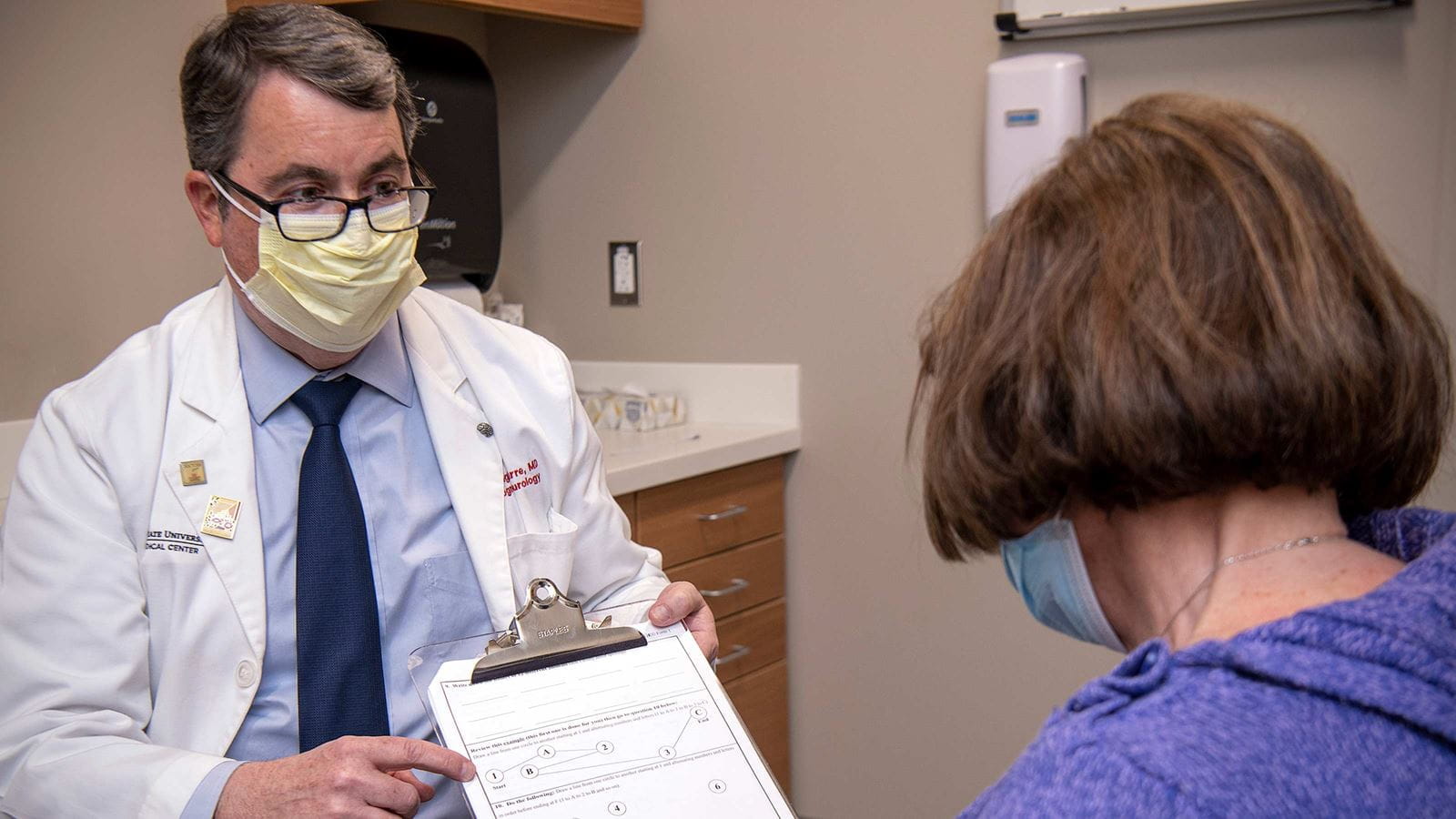Memory loss is the most common symptom of Alzheimer’s disease and it’s often the first one you or your loved ones might notice.
Alzheimer’s disease typically affects the part of the brain responsible for learning and memory first.
As we age, some brain changes and forgetfulness are normal, but this type of memory loss is persistent and worsens.
Next, you may forget someone’s name or get lost while driving home, for example.
The disease progresses in stages, and eventually people will experience greater memory loss and decline in other cognitive functions, such as reasoning, vision, communicating and behavior, to the point where their ability to do daily tasks is impacted.
That’s why it’s important to have a partner like the Alzheimer’s disease experts at the Memory Disorder Clinic at The Ohio State University Wexner Medical Center to help identify early warning signs and symptoms of the condition and provide groundbreaking treatments to try to slow this progression.
What are the stages of Alzheimer’s disease?

Since Alzheimer’s disease is progressive and symptoms worsen over time, it’s often looked at in stages.
These are generally referred to as the early stage, middle stage and late stage. Symptoms typically are mild during the early stage, more moderate during the middle and severe during late-stage Alzheimer’s disease.
Exactly what a person experiences during each stage will differ, as will the length of time they remain in each stage. We do have medications that can slow the progression from stage to stage for some of the people we treat.
Alzheimer’s disease symptoms during these stages include cognitive, behavioral, and functional changes.
What are early symptoms of Alzheimer’s disease?
At this stage, you or your loved ones might notice subtle symptoms. However, these changes can be both frustrating and concerning.
Some common early-stage Alzheimer’s symptoms include:
- Forgetting names of new people you meet
- Struggling to find the right word at times
- Losing items or putting them in not usual places (like car keys in the freezer)
- Forgetting what you just read
- Having difficulty performing tasks in social or work settings
- Experiencing increased trouble with planning or organizing
What are moderate symptoms of Alzheimer’s disease?
During the middle stage, symptoms may become more pronounced and more behavioral symptoms begin to appear.
People with the disease might need more care, now, but they’re still able to do daily tasks with assistance, especially if those tasks have been simplified. It’s important to find and focus on activities people can still do during this stage.
This stage is the longest and can take people years to progress through.
Some common middle-stage symptoms include:
- Forgetting names of people you know
- Struggling to remember events from the past
- Confusing days and months
- Feeling moody or withdrawn
- Needing help with daily tasks, such as choosing appropriate clothing
- Wandering or frequently getting lost
- Experiencing behavioral changes, such as becoming easily agitated, apathy, restless, or moody
- Having false beliefs or suspiciousness
- Changing sleep patterns
What are severe symptoms of Alzheimer’s disease?
At this point, a person with Alzheimer’s disease most likely will require around-the-clock care.
They’ll be less able to communicate or comprehend.
Common late-stage Alzheimer’s symptoms include:
- Losing coordination of physical abilities, such as walking, feeding, or controlling bladder or bowels
- Having difficulty communicating
- Losing awareness of recent events or surroundings
- Groaning, moaning or grunting
- Struggling to swallow
- Experiencing more medical problems, such as seizures, weight loss or infections

FAQ: How to spot the early signs of dementia and Alzheimer's disease
Our memory disorder experts have compiled a list of the most frequently asked questions about these conditions, including how to spot early warning signs and how to talk with a loved one if you suspect a potential memory issue.
Ways we diagnose Alzheimer’s disease
 The Alzheimer’s disease specialists at the Memory Disorders Clinic at The Ohio State University Wexner Medical Center have been at the forefront of diagnosing the disease for decades. With advancements made here in Columbus, we help health care providers across the globe identify the condition in their own practices.
The Alzheimer’s disease specialists at the Memory Disorders Clinic at The Ohio State University Wexner Medical Center have been at the forefront of diagnosing the disease for decades. With advancements made here in Columbus, we help health care providers across the globe identify the condition in their own practices.
We developed the Self-Administered Gerocognitive Exam, also known as the SAGE test, to detect the early signs of cognitive, memory or thinking impairments.
It’s a pen-and-paper test that takes 15 minutes to complete. Though it’s best to take it at your doctor’s office, it can be taken anywhere and then submitted to your health care provider for scoring. It is also available in digital format.
While the SAGE test does not diagnose any specific condition, it’s often the first line of testing offered by physicians if you’re experiencing troublesome memory or cognitive symptoms. The results help your doctor know if further evaluation is necessary.
If the results of your SAGE test determine you might have cognitive impairment suggestive of Alzheimer’s or dementia, we’ll use a variety of other methods to help make a diagnosis.
The combined results of these assessments can provide a definitive diagnosis for Alzheimer’s disease and allow us to personalize a treatment plan for you.
Other diagnostic tools to test for Alzheimer’s disease include:
- Further mental status testing
- Physical examination and medical history
- Interviews with family members
- Genetic testing for biomarkers for Alzheimer’s disease
- Neuropsychiatric assessment – given by a mental health professional to help determine if the symptoms are being caused by depression or other psychiatric issues.
- Neuropsychological assessment – measures cognitive abilities including memory, language, visual perception and other brain functions.
- Blood and other laboratory tests – determine if memory loss and other dementia symptoms are being caused by something other than Alzheimer’s disease.
- Imaging studies – provide detailed images of the brain. The imaging techniques include:
- Computed tomography (CT)
- Magnetic resonance imaging (MRI)
- Positron emission tomography (PET) scan, a technique that enables us to give a definitive early diagnosis of Alzheimer’s disease

